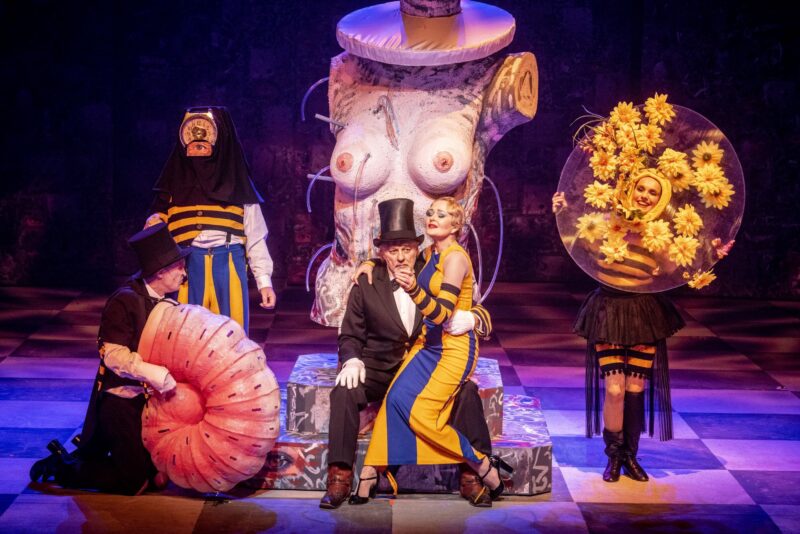Jonas Vaitkus

“The Great Highway”. Photo by D. Matvejevo
Jonas Vaitkus (b. 1944), the renowned educator of theatre and film directors and a laureate of the Lithuanian National Prize for Culture and Arts, is undoubtedly the most productive Lithuanian director – he has directed over a hundred drama and opera performances in various Lithuanian and foreign theatres and five films. Vaitkus graduated in directing studies from the St. Petersburg State Academy of Theatre Arts, and later attended a two-year course of the State Committee for Cinematography in Moscow. He worked as the artistic director of Šiauliai Drama Theatre, Kaunas State Drama Theatre, Lithuanian SSR Academic Drama Theatre (now the Lithuanian National Drama Theatre), Russian Drama Theatre of Lithuania and taught at the Lithuanian Academy of Music and Theatre. Following the scandal of #MeToo nature in 2018, he is currently working as a freelance director.
Vaitkus’ work is best characterised by an active social position and the search for innovative theatre forms. In interpreting works of classical literature and contemporary dramaturgy, the director raises the issues of human existence and social ethics.
Vaitkus’ performances have been shown in Germany, Scotland, Georgia, France, the USA, Poland, Italy, Finland and Russia. His work has been awarded the Lithuanian National Prize, the prize of the Golden Fleece in Tbilisi, the Scotsman Fringe First Award in Edinburgh, the St. Christopher’s prize for Best Director of the Year in Lithuania, the Golden Cross of the Stage (2004, 2007, 2008, 2013) and the Borisas Dauguvietis Earring (2012).
Pedagogy occupied an important place in Vaitkus’ work. Apart from the Lithuanian Academy of Music and Theatre, the director also taught acting at Emerson College (USA), Staten Teater (Norway), the Theatre Academy in Helsinki (Finland), the Danish National School of Performing Arts and the National Academy of Theatre Arts in Krakow (Poland).
In 2018, Vaitkus, then a director of the Russian Drama Theatre of Lithuania (from 2008) and a professor at the Lithuanian Academy of Music and Theatre, was publicly accused of sexual harassment by a young set designer, several actors (his former students) and a former assistant. Vaitkus denied the allegations, saying that it was a slander campaign carried out by Russian propaganda channels to prevent him from winning the competition for the director’s post at the Russian Drama Theatre of Lithuania once his contract has expired. After this information and accusations of unethical and inappropriate for an academic behaviour spread in public, the Ethics Committee of the Lithuanian Academy of Music and Theatre conducted a study, during which detailed data confirmed that Vaitkus lacked respect for human dignity and did not observe the norms of ethical personal relations, responsibility and respect in choosing teaching methods and communicating with the students of the academy. Therefore, the Senate of the Lithuanian Academy of Music and Theatre adopted a decision stating that the professor had violated the ethics of the Academy, and his employment contract that had ended in June 2018 was not extended. As Vaitkus did not get the post of the director of the Russian Drama Theatre of Lithuania in 2018, he became the main director at this theatre instead. He left the theatre in 2020 and is currently working as a freelance director.
After the repercussions of these events that were widely discussed in the Lithuanian media, Vaitkus responded peculiarly with his choices of dramatic material: in 2019, he directed Wolfgang Amadeus Mozart’s opera, Don Juan, at the Klaipėda Musical Theatre, and The Thirteenth Apostle, or a Cloud in Trousers based on poetry by Vladimir Mayakovsky at the Russian Drama Theatre of Lithuania. In 2020, after a four-year break, Vaitkus returned to work on a theatre performance at the Lithuanian National Drama Theatre. Due to the quarantine during the coronavirus pandemic, he presented the premiere of the performance
The Great Highway based on the last play by August Strindberg broadcast live online. It is an allegorical tale, a summary of the thoughts of a playwright’s entire life, a journey into his memory. It is no coincidence that his last drama is being compared to a kind of a testament or theatrical self-portrait.
According to the director, this play does not hold back in exposing a person: from any country, of any nationality, gender, colour etc., a person vulnerable in the face of eternity.
vaitkusj@yahoo.com